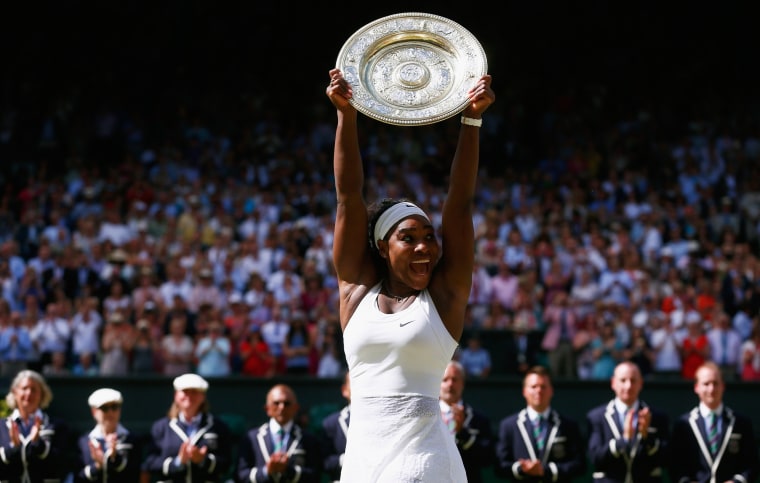Many have argued that we shouldn’t pay attention to the earnings of professional athletes or celebrities. After all, the average person can only dream of making a million dollars in their lifetime, let alone millions of dollars a year. While there may be some truth to this assessment, the reality is that the disparities many of us face with regard to pay inequity, play out on the world stage with professional athletes and celebrities.
This month, we’ve witnessed amazing athletic prowess from not only the U.S. Women’s Soccer team, who sailed to victory in one of the most exciting and most watched World Cup’ Tournaments in U.S. history—(the women’s match garnered larger audiences than the 2015 NHL Finals, the 2015 NCAA men’s basketball tournament and the 2014 World Series)—but also Serena Williams, who claimed her 21st Grand Slam title, solidifying her as what I believe to be one of the greatest athletes in the world, man or woman.
These women have given us much to celebrate, but also to think about when it comes to the glaring discrepancy in pay each are facing due to gender and racial discrimination.

Sarah Jane Glynn, Director of Women’s Economic Policy at the Center for American Progress had this to say, “As Serena Williams just demonstrated, she is a world-class athlete who plays with incredible talent, grace, and mastery of her sport. The same can be said of the U.S. Women's soccer team, who has won the FIFA Women's World Cup a remarkable three times. These are women who represent not only their chosen sports but the entire United States in international competitions, and the fact that they experience so much gender (and in Williams' case racial) discrimination should be considered a national embarrassment.”
To put things into perspective, the men’s U.S. Soccer team has never won a title, but received $9 million for losing in the World Cup quarterfinals—the victorious women’s team on the other hand received $2 million for WINNING the World Cup.
There are many like the Daily Beast’s Lizzie Crocker, who tell us to “stop moaning and tweeting” about the female soccer player’s paltry 6 cents to the male soccer player’s dollar, and attend the games instead, which will boost corporate interest and sponsorship. I may disagree with the fact that we should stop talking about it, but she does have point. We need support these players in social media and the stands because at the end of the day their earning is a numbers game.
Consequently, the pay discrepancy that Serena Williams faces is no longer in Grand Slam prize money, thanks to her sister Venus, but rather in endorsements. Until 2007, male tennis players were paid more than female players for winning at the same tournaments (excluding the U.S. and Australian Open, which made changes decades ago). Venus Williams took her brand and extraordinary platform to bring attention to Wimbledon’s prize money pay discrepancy based solely on gender. In an op-ed in the London Times back in 2006, Venus wrote this:
I believe that athletes — especially female athletes in the world’s leading sport for women — should serve as role models. The message I like to convey to women and girls across the globe is that there is no glass ceiling. My fear is that Wimbledon is loudly and clearly sending the opposite message: 128 men and 128 women compete in the singles main draw at Wimbledon; the All England Club is saying that the accomplishments of the 128 women are worth less than those of the 128 men. It diminishes the stature and credibility of such a great event in the eyes of all women.
In 2013, Title IX turned 40 and in celebration of the policy that helped to transform women’s sports, ESPN chose nine female filmmakers to produce nine documentaries covering the historic policy. Director Ava DuVernay was one of the nine filmmakers approached to cover a topic of her choosing and she chose to document Venus’s crusade for equal pay in the film, Venus VS. With regard to the film and Venus, DuVernay said, “I think you have to speak truth to power… If truth is not being spoken, then power doesn’t shift.”
While women’s tennis has lead the way for pay equity in women’s sports; which Serena has benefited from, her endorsement deals are not on par with her 4th ranked rival Maria Sharapova, and the theories don’t vary that much on why. Sharapova boasts barely a quarter of the titles that Williams has to her name, yet her endorsements are double that of the number one seed.
"If being the best in the world doesn't make you immune to racism and sexism I am not sure what hope the rest of us have to be able lean in far enough to overcome it.”—Sarah Jane Glynn, Center for American Progress
Sharapova however, fits the Eurocentric view of beauty, tall, slender and blonde. Serena doesn’t fit that standard. To the contrary, Williams’s body has been wrongly dissected, parodied and likened to that of animals.
A Forbes article asked the question whether “appeal or corporate bias” explains the endorsement gap between the two. I would argue it’s both. The 2005 Harvard study entitled, Why Beauty Matters, outlined that much like gender and race, beauty or perceived beauty plays a role in how employers decide wages for employees. This would explain corporate hesitation in endorsing Williams in a field that is still largely viewed as a white, elite country club sport.

Sarah Jane Glynn of CAP, summed up my sentiments beautifully adding,“Many would like to write their experiences off as aberrations, and certainly the lives of elite athletes look very different from the rest of ours. But the discrimination these women face can help to highlight a number of issues that all women face. First, and perhaps most obviously it shows how ridiculous it is to tell women that if we just try our best we can overcome cultural and structural oppression. If being the best in the world doesn't make you immune to racism and sexism I am not sure what hope the rest of us have to be able lean in far enough to overcome it.”
Serena Williams is arguably the most decorated athlete of all time and yet regardless of the shimmer that the sparkle from her countless trophies create, it doesn’t distract from the reality that our society even in 2015, still doesn’t value blackness in general, and the black female body specifically.
